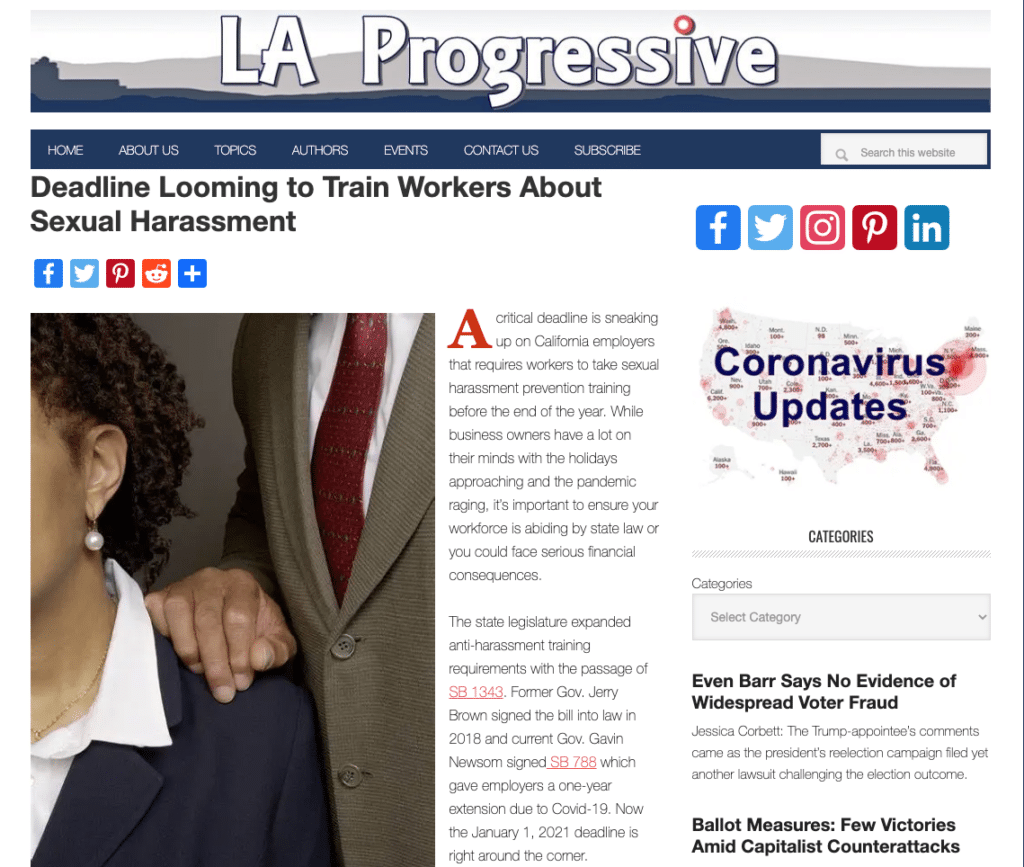By John Winer
February 1, 2021
Workplace sexual harassment is an event that can occur slowly over time or in an instant and can take many different forms. It can come from a supervisor, a colleague, or a customer, and ranges from unwanted touching, inappropriate comments or jokes, or the promise of a promotion in return for sexual favors. There are no parameters for how sexual harassment “must” occur to give an employee grounds to file a complaint. Our firm recently filed a lawsuit on behalf of two former employees against their former employers and supervisor, alleging they were subjected to physical and sexual harassment, and faced retaliation in response to their complaints.
“This supervisor exploited his authority by making unwanted comments and sexual advances towards his subordinates,” said founding and managing partner John Winer. “Stepping up to file a sexual harassment complaint takes a lot of courage, and these employers chose to ignore the supervisor’s ongoing misconduct. Employers have the right to protect their employees and take appropriate steps to prevent and correct unlawful harassment that occurs in the workplace in order to create a safe work environment.”
In March 2016, our client began working as a janitor at a skilled nursing and rehabilitation center in Walnut Creek owned and operated by Generations Healthcare, LLC, and GHC of Walnut Creek, LLC. The plaintiff was assigned to work at the center by HCSG West, LLC, Care Center of Rossmoor, LLC, and Healthcare Services Group, Inc., which supply housekeeping and other services to various healthcare facilities. In 2017, a new supervisor began subjecting nearly daily, unwelcome verbal and physical harassment against the plaintiff. The supervisor’s unwanted physical harassment included slapping the plaintiff’s buttocks, grabbing his arms, and twisting and touching him inappropriately on his chest. The supervisor also regularly made comments of an offensive, degrading, and sexual nature about our client, his wife, and other employees.
After a while, he submitted formal complaints of sexual harassment, to which he never received a response. Instead, the plaintiff was suspended and terminated on account of his gender and in retaliation for his protected conduct. The lawsuit contends the plaintiff was subjected to a hostile work environment in which egregious sexualized conduct was severe and pervasive, and then retaliated against by fabricating false allegations in support of their efforts to suspend and terminate him.
We are also representing a former employee of the skilled nursing and rehabilitation center in Walnut Creek. She began her employment in 2018 as a dietary manager and claims that during her time there, she faced a toxic environment in which frequent, ongoing, offensive verbal and physical sexual harassment. According to the lawsuit, this behavior was not only tolerated but endorsed by her former employer and supervisor who would see and interact with the plaintiff as her office was located next to his, and she regularly ran into him throughout the day. The supervisor subjected her to unwelcome and offensive comments of a sexual nature. He would frequently stare at her during their interactions and meetings or while passing her in the hallway and would stare at her in a sexual manner. On numerous occasions, the plaintiff also observed how her former supervisor would make demeaning and belittling comments to other employees. In 2019, our client was discharged from employment as a result of her supervisor’s inappropriate and harassing conduct and the hostile work environment.
The harassment and abuse of employees by their supervisors is an issue that can create an oppressive, hostile, intimidating, abusive, and offensive work environment, and can interfere with their emotional well-being and ability to perform their duties. According to the U.S. Equal Employment Opportunity Commission (EEOC), unwelcome sexual advances, requests for sexual favors, and other verbal or physical conduct of a sexual nature that constitutes sexual harassment directly violate Title VII of the Civil Rights Act of 1964. One-way employers can combat sexual harassment in the workplace is by establishing a written nondiscrimination policy, including a specific policy against sexual and all other forms of harassment. The policy should define sexual harassment and be published in the employee handbook, as well as establish how an employee will be able to report harassment and other types of workplace issues.



